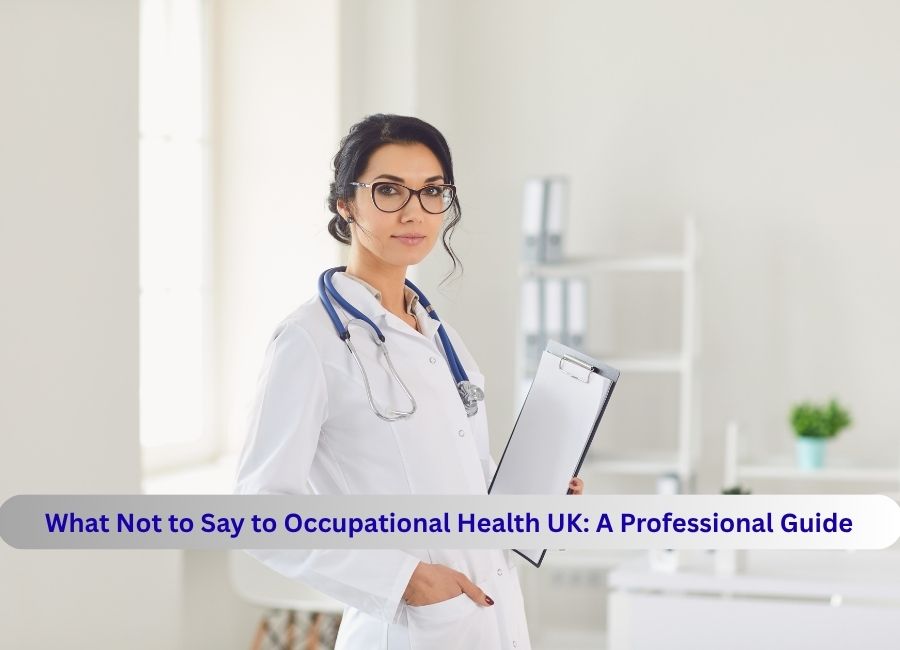What Not to Say to Occupational Health UK: A Professional Guide

Being referred to Occupational Health (OH) in the UK can feel daunting if you have never been through the process before. Many employees worry about what to say and, more importantly, what not to say during an occupational health assessment. The determination of OH is to defend your health and confirm that your manager can provide the right care for you in the office. It is not a punitive interview. However, how you handle the discussion can affect the consequence. This guide explains what not to say to occupational health in the UK, why certain statements can be unhelpful, and how to prepare yourself for a constructive and professional consultation.
Why Words Matter in an Occupational Health Assessment

1. Avoid Saying “I’m Fine” When You Are Not
One of the most common faults employees make is trying to appear “strong” by saying that everything is fine, even when they are off-color or stressed. If you are having difficulty with your health, the occupational health team cannot recommend appropriate support unless they know the full picture.
Better approach: Be honest about your condition. If you are anxious or uncomfortable talking about it, explain that at the start. Honesty ensures you get the help you need.
2. Do Not Blame Your Employer or Colleagues Directly
It is natural to feel upset if your health issues are linked to workplace stress, but a discussion is not the right time to escape anger or blame individuals. Statements such as “It’s all my manager’s fault” can make you appear unhelpful and may shift attention away from your health needs.
Enhanced tactic: Explain what reasons in your job disturb your health without naming or criticizing people. For example: “The workload and lack of breaks have been affecting my stress levels.”
3. Avoid Exaggerating or Hiding Your Difficulties
Another common mistake is saying you can manage everything when in reality you cannot, or hiding medical conditions out of fear that it will reflect badly on you. If you claim that you can handle tasks that you are physically or mentally unable to do, you risk being placed in unsuitable duties, which can make your condition worse.
Better approach: Provide a clear, realistic description of what you can and cannot do. This allows occupational health to recommend adjustments that will help you perform safely.
4. Do Not Minimize Mental Health Concerns
Mental health issues such as anxiety, depression or burnout should not be brushed off with comments like “It’s just stress” or “I’ll be fine soon”. Professional health specialists are accomplished to support psychological as well as physical health. If you downplay the problem, they cannot provide you with effective solutions.
Better approach: Explain your symptoms and how they affect your work performance. Be specific: “I find it hard to concentrate, and I sometimes feel overwhelmed during meetings.”
5. Avoid Refusing Help Without Consideration
Some employees say “I don’t need any help” out of pride or fear that accepting adjustments may be seen as weakness. However, support such as flexible working hours, changes to equipment, or a phased return to work can make a huge difference.
Better approach: Be open to recommendations. Even if you do not need help now, it is wise to discuss possible options.
6. Do Not Focus on Legal Threats or Complaints
An occupational health consultation is not a legal investigation or grievance hearing. Using the session to threaten legal action (e.g., “I’ll take this to court!”) diverts from the purpose of the nomination, which is to assess your health and your skill to work.
Better approach: Stay calm and focus on your health. Separate legal or HR matters from the OH consultation.
7. Avoid Being Vague
Phrases such as “I just don’t feel right” or “It’s complicated” do not give the occupational health professional enough detail to make informed recommendations.
Better approach: Give examples of how your symptoms affect your job: “I get severe back pain after sitting for more than 30 minutes, which makes it hard to complete reports.”
Key Takeaways
Be honest but professional: Avoid exaggerating, hiding, or minimising issues.
Focus on facts, not blame: Describe your situation without criticising individuals.
Be specific: Clear examples help OH understand how to support you.
Accept support: Occupational health exists to help you stay healthy at work.
Final Thoughts

Knowing what not to say to occupational health in the UK will help you get the most out of your appointment. The consultation is designed to support you, not to penalise you. By remaining calm, clear and cooperative, you give the occupational health team the information they need to recommend adjustments that can make your working life safer and more manageable.
Meta description: Learn what not to say to professional health in the UK. Avoid common mistakes and get the right support during your occupational health assessment.






